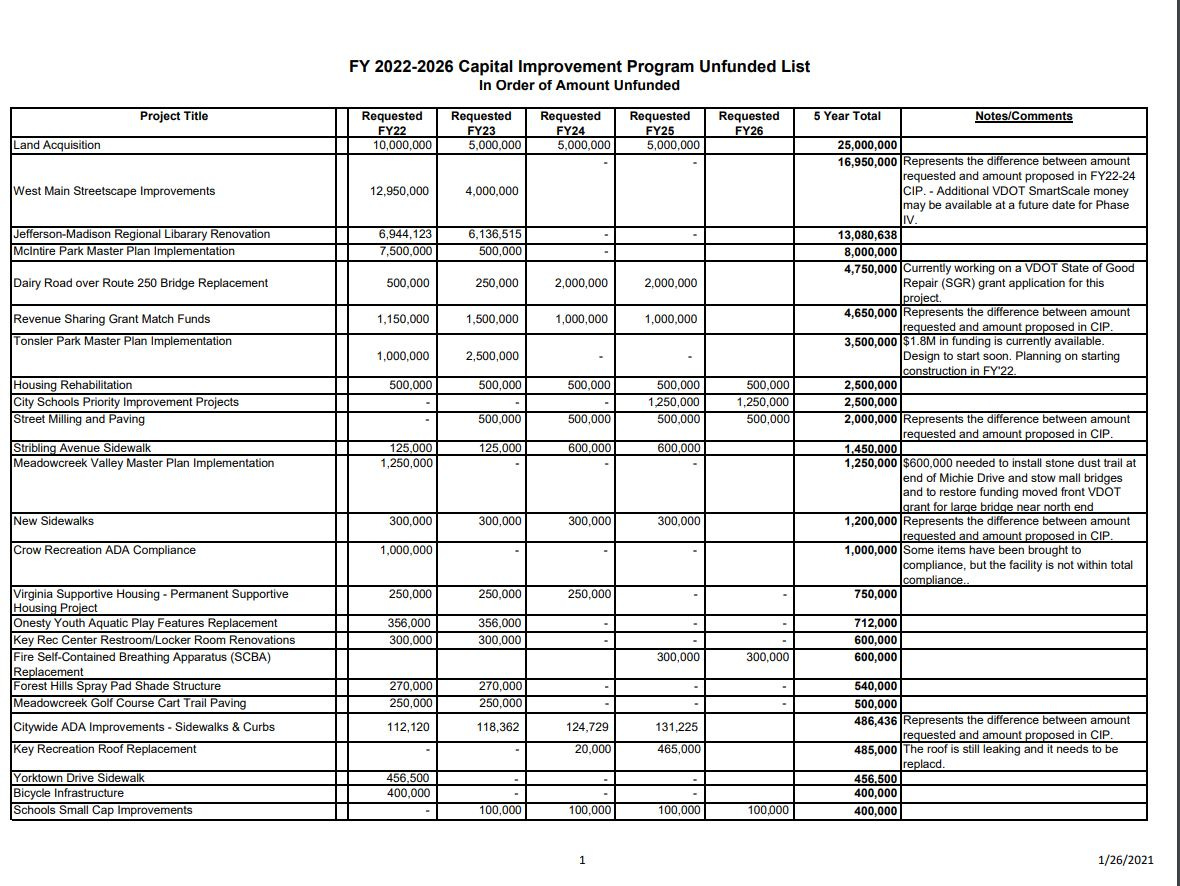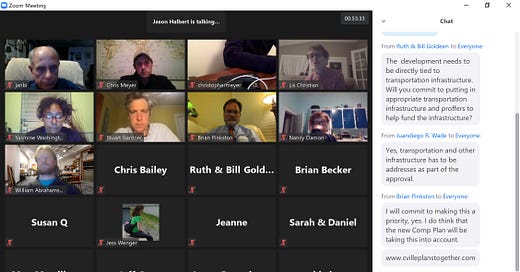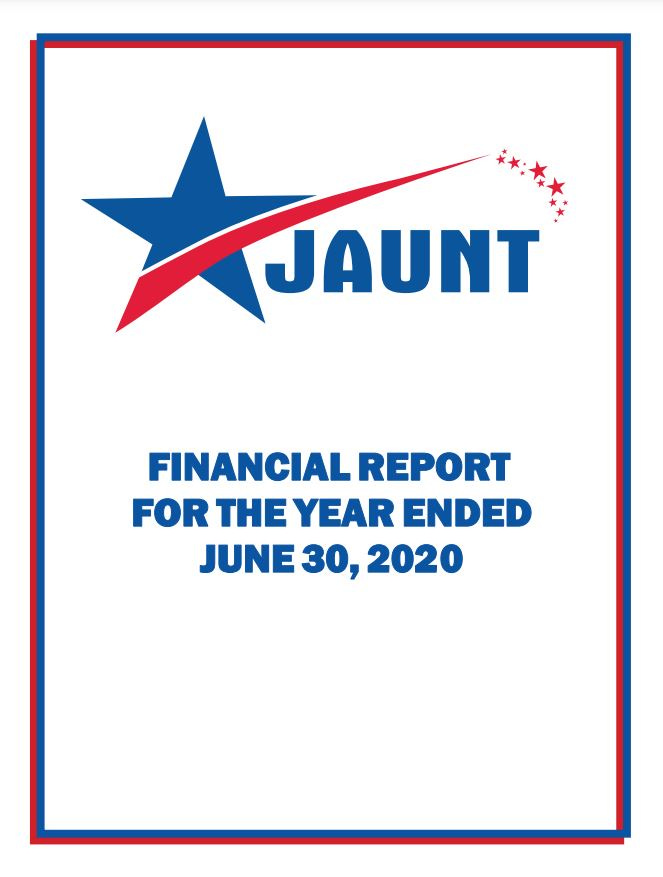In today’s Patreon-fueled shout-out...your local energy nonprofit, LEAP, offers FREE home weatherization to income- and age-qualifying residents. If you’re age 60 or older, or have an annual household income of less than $75,100, you may qualify for a free energy assessment and home energy improvements such as insulation and air sealing. Sign up today to lower your energy bills, increase comfort, and reduce energy waste at home!
On today’s show:
The four candidates for two seats on the Charlottesville City Council introduce themselves to the Fry’s Spring Neighborhood Association
Jaunt issues a statement explaining that the former CEO was asked to resign for improper use of funds for travel, and Brad Sheffield responds
There’s a vacancy on the Charlottesville Planning Commission
The Charlottesville Regional Chamber of Commerce adds four new board members and gets a new chair
An audit of the transit agency Jaunt has found that former CEO Brad Sheffield “purchased numerous expenses for goods, services, and travel which violated internal control policies of the corporation.” The Robinson, Farmer, and Cox (RFC) review of the fiscal year budget also found that the total amount of alledgely misused funds could not be calculated. The agency issued a statement this morning about the irregular transactions.
“As RFC’s audit progressed, and more information came to light, Jaunt’s Board felt that they were no longer comfortable with the business judgment of then-CEO Brad Sheffield,” wrote communications director Jody Saunders. “On December 5, 2020, with the audit findings still months away, the Board made the difficult decision to request Mr. Sheffield’s resignation as CEO.”
Sheffield resigned on December 7, 2020 and Karen Davis took over as interim. Sheffield served one term on the Board of Supervisors representing the Rio District. During that time, he became CEO of Jaunt, which operates fixed-route and on-demand service in the region. The statement said stronger controls have been put in place.
Sheffield denied any wrongdoing and issued his own statement about two hours later according to a tweet from CBS19.


“JAUNT competitively procures funding by providing a range of public and private transportation services, which means the company must be run efficiently to turn a profit,” Sheffield said. “I ran it efficiently and no JAUNT policies were violated.”
Sheffield said all of his travel expenses were in compliance with Jaunt’s policies.
Jaunt changed its official name from JAUNT during a rebranding a few years ago.
There are now four candidates in the race for two Democratic nominations for two seats on the Charlottesville City Council. All of them participated in a candidates forum held last night by the Fry’s Spring Neighborhood Association. The newest candidate, Carl Brown, went first during the opening statements. He’s a native of Charlottesville.
“I’m currently a social entrepreneur in the community,” Brown said. “Part of my platform is my home-grown sense. I have a better sense of this community than most people. My family came here probably eight generations ago.”
Brown said he used to live on Stribling Avenue, a road in the Fry’s Spring neighborhood on which there’s a proposed dense development. More on that in a moment. Next, Yas Washington launched into her platform.
“My vision for Charlottesville is to be able to properly allocate all of our overall operating budget being $190.12 million,” Washington said. “Aside from that, definitely being able to build the city back up as we recover from the hardships of COVID.”
Washington has worked on several political campaigns in the area and said she wanted to work on environmental sustainability, criminal justice reform, and equity for low-income residents.
Juandiego Wade has served four terms on the school board and lives in the Locust Grove neighborhood.
“I have been working with Albemarle County for the past thirty years first as a transportation planner and for the last ten years doing career counseling,” Wade said.
Wade said he demonstrated he can work with neighborhoods in his time as a transportation engineer. He said his priorities include criminal justice reform, affordable and workforce housing, public education, and climate change.
Pinkston ran for the Democratic nomination in the June 2019 primary and placed fourth in a contest where the top three were on the November ballot. He was just 110 votes behind Sena Magill.
“My professional background is in project management,” Pinkston said. “And I always like to say that project managers put people, resources and ideas together to get things done.”
The first question focused on infrastructure needs of the Fry’s Spring neighborhood, namely improvements on Stribling Avenue to make it safer for pedestrians and cyclists following a future development on the western end that could see as many as 170 units. Jason Halbert is the FSNA President and he asked how each candidate would work to ensure that those improvements would be funded and implemented.
“What practical steps do you think you can take on Council if you’re on Council to bring more transparency to the CIP and the capital planning process so that neighborhoods and neighborhood leaders understand and can reflect back to their neighbors where these projects lie as a priority for the city?”
Pinkston went first and said he understood the need for transparency and follow-through.
“As a City Councilor I would be responsive if people came to me and said this has been on the list all this time,” Pinkston said. “The issue that I see with the CIP is that priorities, large priorities come up every couple of years. A few years ago, no one was really talking about affordable housing in the way that we are now and that’s a really important priority and yet these other things that might be considered smaller or just sort of the granular aspects to what makes a city work, you’ve gotta have sidewalks, get lost.”
Wade said he would direct staff to look into creative ways to fund such a project.
“I would see what the project is and see if there are any safety grants out there,” Wade said. “There’s always some type of safety grant. Now with UVA’s new positioning on being a more friendly to the neighborhoods, I would go to UVA, the Equity Center or something, and say ‘hey! This is a $20,000 project, is this something that you can do?”
Wade said he would also look at the CIP itself to see if the most appropriate projects were being funded each year.
Washington said she recognized the importance of better infrastructure.
“I think it’s very important that as development takes place and congestion and everything due to the population and how that is going to traffic, I definitely think it is important to make sure that we are enhancing the quality of walkability,” Washington said.
Brown said he would use his own project management experience to help get things done, including reaching out to a wide variety of stakeholders.
“One of the things that I would like to utilize are those presidents that are on those associations for each neighborhood,” Brown said. “Much like you have issues in your neighborhood, I know there are others.”
Brown said he is familiar with the unsafe conditions on Stribling and he echoed Wade’s call to work with the University of Virginia to see if they could help assist.
“Particularly because they have individuals that are attending the University in that neighborhood as well and see what they would be willing to contribute for the good of the whole,” Brown said.
The next question was about that 11-acre and 170-unit development being pursued by Southern Development that will take a rezoning to Planned Unit Development (PUD). The Planning commission asked the developer to increase residential density and many in the neighborhood are skeptical.
“We just talked about the fact that this road is not safe now and if you add between 200 and 300, between 300 and 400 units on this end of Stribling, and there are others being discussed in the county, because the road goes into the county, you’re talking about a nightmare for this neighborhood,” Halbert said.
Halbert asked how Council should balance the need for more housing with the resulting need for infrastructure.
“Are you for more density and more affordable housing, or should you work with the neighborhood in a way that allows for this?”
Wade said Albemarle and Charlottesville have to work together.
“So what I would recommend is that I would employ staff to go out and maybe use some of the good minds over at the University to seek out solutions that other cities have done,” Wade said.
As a quick reminder outside of this narrative, it’s now been one year since the University of Virginia announced it would build up to 1,500 low-income houses over the next decade on land that it or its real estate foundation owns. (March 10, 2020 press release)
Wade said he would push developers to come up with better solutions.
“I know working with developers for 20 years is that they will do whatever they can to make the quickest buck,” Wade said. “We can convince them that this is Charlottesville and we want something different. These are the things we value as a community.”
Pinkston said he supported the affordable housing plan that was just endorsed by the City Council. To prep for the Fry’s Spring forum, he reached out to a member of the Planning Commission.
“I was talking to Hosea Mitchell today, he’s on the Planning Commission, and I asked him specifically about this site on Stribling and he knows and agrees that there’s not sufficient infrastructure to pull this off,” Pinkston said. “And so I think there’s a realization that the city and/or the developer need to put in the proffers to put that sidewalk and the other improvements that are there.”
Brown said he wanted to know more about what it means for housing to be “affordable.”
“What is a clear definition of affordable?” Brown asked. “That’s what I’ve been asking myself. Because once we start talking about affordable housing, then it goes to low-income housing instantly in the same sentence.”
Brown said the government should not be playing a role in telling developers what they should be building, and that neighborhoods should play a stronger role in deciding what they want to see.
“What I would encourage is again, collaboration,” Brown said. “When we talk about low-income housing, there are houses in this community that we could have investors who invest in that kind of thing, low-income housing, that we haven’t seen before.”
Washington said there is a challenge in achieving density in some places, such as the Fry’s Spring neighborhood.
“Basically, with the R-1 zoning it’s very hard to be able to create density because it’s one unit per lot, but when you go further into that and you start talking about the specific classes as far as R-1B, or whatever the case may be, you then go to 2 to 3 units per lot which is where affordable housing can actually be incorporated,” Washington said.
I’ll post a longer edited version of the audio from the forum sometime within the next 24 hours.

There’s a vacancy on the seven-member Charlottesville Planning Commission. Gary Heaton was appointed to the body in October 2018 soon after moving to the city to become senior pastor of First United Methodist Church. He told his colleagues he’ll be leaving the city shortly for another professional posting.
“I will be reassigned as of July so I think will be exiting my responsibilities on the Planning Commission what did I say, the 15th of April,” Heaton said.
However, his exact last day may be later than that depending on whether the seat can be filled. The vacancy has not yet been posted on the city’s Boards and Commission page. There is also a vacancy on the Board of Zoning Appeals. Learn more about the Planning Commission on the city website.
The Charlottesville Regional Chamber of Commerce has a new chair and four new board members. Guy Browning will serve a one year term to replace another person who took a job outside of the community. Browning is the senior vice president of MacMillan Publisher Services, a global company that operates its U.S. arm from an office in Gordonsville. The other new board members are:
Kara Chandeysson, City Manager for Ting Charlottesville
Keith O’Neil, Chief Operating Officer for UVA Community Credit Union
Ravi Respeto, President & CEO for the United Way of Greater Charlottesville
Charlie Rogers, President/CEO for Innovative Software Solutions (ISS).
Thanks as always for reading! Do take a listen if you have not so far. Subscribe in Apple Music or on Spotify or wherever you get your podcasts. There are usually more jokes and flowery writing.

















Share this post